Part Twenty Three. Why study U.S. Department of Commerce Investigation into Auto Imports?
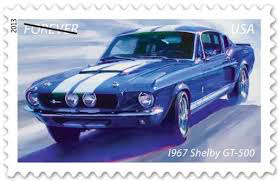 2013 1967 Shelby Et-500 Forever USA
2013 1967 Shelby Et-500 Forever USA
This is Part Twenty Three of a series showing how inflation, deflation, barter, tariffs, taxes, postage, war, counterfeiting, history, economics, ‘free’ trade, famine, dearth, climate, auctions, precious metals, religion, and education are combined into one great whole.
Part Twenty Three. Why study U.S. Department of Commerce Investigation into Auto Imports?Previous parts explained how trade taxes, tariffs, levies or countervailing duties, are a national security matter and how China’s unauthorized intrusions, anti-monopoly and talent acquisition, Acts, Policies, and Practices Related to Technology Transfer, Intellectual Property, and Innovation, discriminatory Licensing, was reported by the United States Trade Representative (USTR). The European Union, a major trading partner, also is involved in unfair trading.
 2011 USA Cars Forever
2011 USA Cars Forever
U.S. Department of Commerce Investigation into Auto Imports
May 23, 2018, following a conversation with President Donald J. Trump, U.S. Secretary of Commerce Wilbur Ross initiated an investigation under Section 232 of the Trade Expansion Act of 1962, as amended. The investigation will determine whether imports of automobiles, including SUVs, vans and light trucks, and automotive parts into the United States threaten to impair the national security as defined in Section 232. Secretary Ross sent a letter to Secretary of Defense James Mattis informing him of the investigation.
“There is evidence suggesting that, for decades, imports from abroad have eroded our domestic auto industry,” said Secretary Ross. “The Department of Commerce will conduct a thorough, fair, and transparent investigation into whether such imports are weakening our internal economy and may impair the national security.”
During the past 20 years, imports of passenger vehicles have grown from 32 percent of cars sold in the United States to 48 percent. From 1990 to 2017, employment in motor vehicle production declined by 22 percent, even though Americans are continuing to purchase automobiles at record levels. Now, American owned vehicle manufacturers in the United States account for only 20 percent of global research and development in the automobile sector, and American auto part manufacturers account for only 7 percent in that industry.
Automobile manufacturing has long been a significant source of American technological innovation. This investigation will consider whether the decline of domestic automobile and automotive parts production threatens to weaken the internal economy of the United States, including by potentially reducing research, development, and jobs for skilled workers in connected vehicle systems, autonomous vehicles, fuel cells, electric motors and storage, advanced manufacturing processes, and other cutting-edge technologies.
Following today’s announcement, the Department of Commerce will investigate these and other issues to determine whether imports of automobiles and automotive parts threaten to impair the national security.
 2013 USA Forever 1970 Plymouth Hemi ‘Cuda
2013 USA Forever 1970 Plymouth Hemi ‘Cuda
Opening Statement by Commerce Secretary Wilbur L. Ross at the Senate Committee on Finance June 20, 2018
Chairman Hatch, [we are] to discuss the actions we have taken to assure the continued viability of our important steel and aluminum industries. The reports, found that steel and aluminum imports threaten to impair our national security. Tariffs are the necessary means to address these threats. [We are] imposing a 25% tariff on steel and a 10% tariff on aluminum imports.
The tariff actions taken by the President are necessary to revive America’s essential steel and aluminum industries. They have been harmed by imports to the point that allowing imports to continue unchecked threatens to impair our national security.
The tariffs on steel and aluminum are anticipated to reduce imports to levels needed for these industries to achieve long-term viability. In the short-term, sense the imposition of the tariffs, industry already has started taking actions to restart idled facility. Idled steel and aluminum capacity is being restarted as we sit here in Illinois, Ohio, South Carolina, Missouri, and Kentucky. Several other companies have also announced new investments in these industries in Oklahoma, Florida, Missouri, and Texas. In addition, the President authorized the establishment of a mechanism for U.S. parties to apply for exclusions. Commerce has received more than 20,000 steel and aluminum exclusion requests, including resubmissions. We’ll be accelerating the processing of exclusion requests by immediately granting those which are correctly submitted in full, which no objections have been received during the public comment period. We also are developing a list of downstream products that have been hurt by imports since the tariffs have been imposed. We have already found some 50 Products. [Do] imports of automobiles and automotive parts in to the united states threaten to impair the national security. This investigation will examine the United States production capabilities and the technologies needed for projected national defense requirements, as well, as the adverse effects of foreign competition on pour Internal economy.
In conclusion, this administration is standing up for American families, American businesses, and American workers by taking action to reduce imports that threaten our National Security.
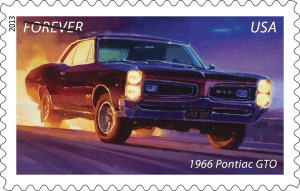 2013 USA 1966 Pontiac GTO Forever
2013 USA 1966 Pontiac GTO Forever
Remarks by President Trump in Meeting with Governors and Members of Congress
Issued on: April 12, 2018
Yesterday, as you know, President Xi made a very good speech, and he said he’s going to open up China. He’s going to open it up, take down a lot of the trade barriers — maybe all of them — but take down a lot of trade barriers.
And he’s going to get rid of a lot of the taxes or tariffs that they charge. Because, right now, if you have — and I use this example because it’s so easy — if we sell a car into China, number one, they won’t take the car; and number two, if they did take the car, it’s 25 percent tariff. Whereas we have no barrier, and when they sell a car into us, it’s 2.5 percent. So they have barriers, but when they don’t have barriers, it’s 25 percent versus 2.5 percent. That’s not a good way to make money. So we’re straightening that out.
We want to be reciprocal. So if they charge 25, we charge 25. If they charge 2.5, we charge 2.5. And maybe what happens is we both charge nothing, because I know we’d all like that. I think Ben would like that better than anybody, okay? That’s simpler than 25. Let’s save all the transfer of funds, right?
SENATOR SASSE: We need more trade.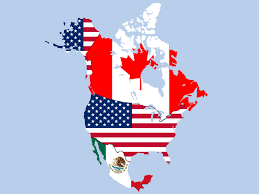
While NAFTA talks are forever in flux no one invests in Mexico
THE PRESIDENT: So that’s what we want. We want more trade. We want no barriers. But the only way you can knock it down, you can’t just go in — for 25 years, Presidents have been trying to negotiate and they’ve been very unsuccessful, because they’d meet and they’d say, “Can we talk?” And the Chinese would say, “Yes, we can.” And that’s what they do — they talk for four years, then they’ll talk for another four years, and that would be the end of that. Nothing would happen. So nothing would happen. So we’re doing a job there.
NAFTA [President Bill Clinton supported 1994] — we’re renegotiating NAFTA. It’s coming along great. I have no time. You know, I keep reading from the “fake news” media that we’re pushing it. I’m not pushing it; I don’t care. Oh, you’re laughing. That’s good, Chuck. See, Fox can smile because — (laughter) — you know, you do a very beautiful job.
But I keep hearing how we’re pushing NAFTA, we want it done. There’s no timeline. There’s no timeline. Now, in the meantime, nobody is moving into Mexico. Because as long as NAFTA is in flux, no company is going to spend a billion dollars to build an automobile plant.
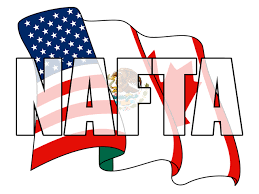 So I say this — I’ve told it to the Mexicans: We can negotiate forever. Because as long as we have this negotiation going, nobody is going to build billion-dollar plants in Mexico, which is what they’ve been doing a lot. They have taken our auto industry by the throat. And so many jobs have been lost, so many massive plants have been built in Mexico. Top-of-the-line stuff. But it’s not happening now, and they’re coming back. Chrysler has moved back; a lot of them have moved back.
So I say this — I’ve told it to the Mexicans: We can negotiate forever. Because as long as we have this negotiation going, nobody is going to build billion-dollar plants in Mexico, which is what they’ve been doing a lot. They have taken our auto industry by the throat. And so many jobs have been lost, so many massive plants have been built in Mexico. Top-of-the-line stuff. But it’s not happening now, and they’re coming back. Chrysler has moved back; a lot of them have moved back.
And the same thing with agriculture, which is going to be our predominant discussion today. So agriculture is okay with NAFTA. Not great. We’re going to make it great. We’re going to make it great.
Giant Sucking Sound Going South – Ross Perot 1992
But we’re going to make a fair NAFTA deal, much better than it is right now. NAFTA has cost this country hundreds of billions of dollars. It has been a disaster. We’ve lost 50,000 factories, millions of jobs. NAFTA has been a disaster.
Again, we’re doing really well with China. I think we’re having some great discussions, and we’ll see what happens. We put a $50 billion tariff on, and then we put $100 billion tariff on. And, you know, at a certain point, they run out of bullets.
Remember what I said: When you’re $500 billion down, you can’t lose a trade war. And I won’t call it a trade war because it’s really a trade negotiation. But nobody ever negotiated from our side. Nobody ever did anything. All they did was talk. And in the meantime, we helped rebuild China because they took so much money — bridges, and airports, and military, and everything. They took so much — hundreds of billions of dollars out of our country.
European Union barriers on American agriculture
The other thing is, if you look at the European Union — we’re talking to them — I don’t know if you realize it, but they have virtual barriers against even agriculture, from going in. So they sell us their Mercedes-Benzes, and they sell us their BMWs, and they sell all the different things.
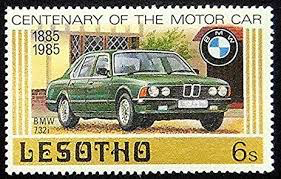 Lesotho 1885-1985 Centenary of the Motor Car Lesotho BMW 732i
Lesotho 1885-1985 Centenary of the Motor Car Lesotho BMW 732i
And we have no barriers whatsoever.
So we are opening up the European Union or we’re not going to be very nice about it. At the European Union, we’ll lose about $151 billion this year. We lose with almost everybody. We lose with Canada. We lose with Mexico. We lose with the European Union. We lose with — certainly, we lose with China, Vietnam. I mean, no matter where you go, it’s very rare — very rare that our country has a surplus.
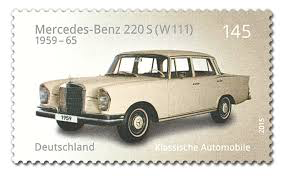 2015 Deutschland Klassische Automobile 145 Mercedes-Benz 220S (W111) 1959-65
2015 Deutschland Klassische Automobile 145 Mercedes-Benz 220S (W111) 1959-65
But we’re changing it. And, as Ben said, we want to have trade. And we want to have barriers taken down because the barriers, in many cases, are far worse than the tariffs. I mean, the tariffs can be bad, but the barriers are very bad.
So the European Union makes it very hard for agricultural products because their farmers don’t want you there. The farmers say, “We don’t want the American farmers.” But that’s not fair because we take all of their stuff. A lot of cars and lot of other things. So they’re going to have to take down the barriers because we can’t have it.
You know, when you think of European Union, you think so friendly, so nice. They’re very brutal to us in terms of trade. So we’re talking about that, too.
We love our farmers. They were so good to me during the election, that whole — much more than center of the country. It’s a big group of people, Joni. Right?
But Sonny Perdue [Secretary of Agriculture] came, and he said, “Look at this.” And he hung up a map, and the whole thing is red.
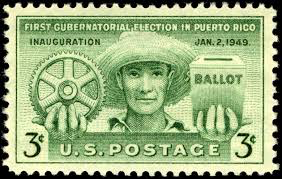 Jan 2, 1949 First Gubernatorial Election in Puerto Rico Inauguration Ballot U.S. Postage 3 Cent
Jan 2, 1949 First Gubernatorial Election in Puerto Rico Inauguration Ballot U.S. Postage 3 Cent
THE PRESIDENT: And we’re starting to get much better results at the World Trade Organization, WTO, because they know we’re not playing games anymore.
AMBASSADOR LIGHTHIZER: [China Situation] just not an issue that can be further kicked down the road.
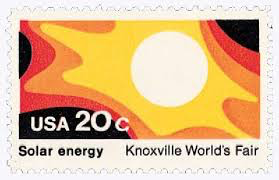 1982 USA 20 Cent Solar energy Knoxville World’s Fair
1982 USA 20 Cent Solar energy Knoxville World’s Fair
32 Solar plants start, 2 survive,
THE PRESIDENT: As you know, we had 32 solar plants, and of the 32, I think 30 were closed, Larry, right? There were — it’s a new industry, but they were getting absolutely killed by China and some others. And we put a tariff on those panels coming in, which were not nearly as good as the ones we make. And now we have two that are open. Can you imagine, of the 32, there were two that are — were just about limping along and barely open.
These two are now doing very well and they’re looking to open seven, eight, nine of the plants.
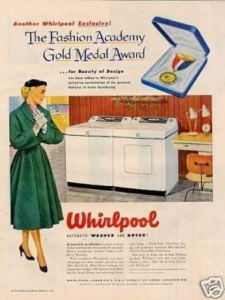 The Fashion Academy Gold Medal Award Whirlpool washer and dryer
The Fashion Academy Gold Medal Award Whirlpool washer and dryer
Dumping washing machines
Same thing with washing machines. They were dumping — if you can believe this — washing machines all over the country. Just dumping them. And we put a 30 percent tariff on, and now washing machine plants are expanding and opening in our country.
So I just want to use tariffs judiciously but it can certainly help. The steel and aluminum industry — 10 percent on aluminum. And you probably have seen, and I sort of thought this might happen, aluminum is down 4 percent since we put a 10 percent tariff on it. So someday, somebody is going to explain that to me. I didn’t think it would be that good; I thought maybe it would go up just a little bit.
KORUS didn’t want to pay tariffs on steel
Steel, we have taken the tariff off some countries when we’ve been able to renegotiate deals. For instance, in South Korea, when they heard they had to pay 25 percent tariff on steel coming in, they went absolutely crazy and we made a deal. The KORUS deal is now pretty much concluded. And we really made that, I would say, Bob, largely because of the fact that they did not like the fact that they were having to pay tariffs on steel.
So we’ve been able to — even the European Union, they’re not happy about the steel, and we’re negotiating with them.
Tariffs get people to the table
In some cases, people are paying tariffs and we’re taking in a lot of money for the country. Those tariffs are tremendous. We’re taking in a lot of money. Not so bad, either. But the tariffs have really helped us. When used properly, they really get people to the table.
Disclaimer: The author of each article published on this web site owns his or her own words. The opinions, beliefs and viewpoints expressed by the various authors and forum participants on this site do not necessarily reflect the opinions, beliefs and viewpoints of Utah Standard News or official policies of the USN and may actually reflect positions that USN actively opposes. No claim in public domain or fair use. © John Choate
Utah Standard News depends on the support of readers like you.
Good Journalism requires time, expertise, passion and money. We know you appreciate the coverage here. Please help us to continue as an alternative news website by becoming a subscriber or making a donation. To learn more about our subscription options or make a donation, click here.
To Advertise on UtahStandardNews.com, please contact us at: ed@utahstandardnews.com.


Comments - No Responses to “Part Twenty Three. Why study U.S. Department of Commerce Investigation into Auto Imports?”
Sure is empty down here...